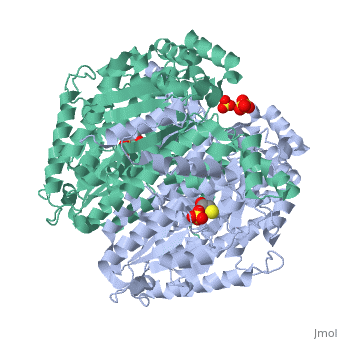1iat
|
CRYSTAL STRUCTURE OF HUMAN PHOSPHOGLUCOSE ISOMERASE/NEUROLEUKIN/AUTOCRINE MOTILITY FACTOR/MATURATION FACTOR
OverviewOverview
Phosphoglucose isomerase (PGI) is a multifunctional protein, which, inside, the cell, functions as a housekeeping enzyme of glycolysis and, gluconeogenesis and, outside the cell, exerts wholly unrelated cytokine, properties. We have determined the structure of human PGI to a resolution, of 1.6 A using X-ray crystallography. The structure is highly similar to, other PGIs, especially the architecture of the active site. Fortuitous, binding of a sulphate molecule from the crystallisation solution has, facilitated an accurate description of the substrate phosphate-binding, site. Comparison with both native and inhibitor-bound rabbit PGI, structures shows that two loops move closer to the active site upon, binding inhibitor. Interestingly, the human structure most closely, resembles the inhibitor-bound structure, suggesting that binding of the, phosphate moiety of the substrate may trigger this conformational change., We suggest a new mechanism for catalysis that uses Glu357 as the base, catalyst for the isomerase reaction rather than His388 as proposed, previously. The human PGI structure has also provided a detailed framework, with which to map mutations associated with non-spherocytic haemolytic, anaemia.
DiseaseDisease
Known diseases associated with this structure: Hemolytic anemia due to glucosephosphate isomerase deficiency OMIM:[172400], Hydrops fetalis, one form OMIM:[172400]
About this StructureAbout this Structure
1IAT is a Single protein structure of sequence from Homo sapiens with SO4 and BME as ligands. Active as Glucose-6-phosphate isomerase, with EC number 5.3.1.9 Full crystallographic information is available from OCA.
ReferenceReference
The crystal structure of human phosphoglucose isomerase at 1.6 A resolution: implications for catalytic mechanism, cytokine activity and haemolytic anaemia., Read J, Pearce J, Li X, Muirhead H, Chirgwin J, Davies C, J Mol Biol. 2001 Jun 1;309(2):447-63. PMID:11371164
Page seeded by OCA on Mon Nov 12 17:28:17 2007
